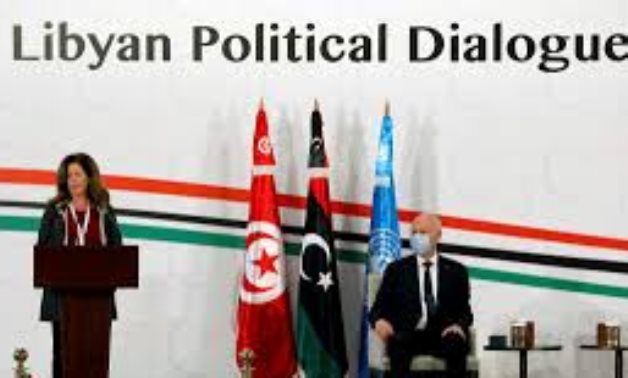
Deputy Special Representative of UN Secretary-General for Political Affairs in Libya Stephanie Williams speaks during Libyan Political Dialogue Forum in Tunis, November 9, 2020. REUTERS
CAIRO - 7 December 2021: UN Spokesperson Stéphane Dujarric said on Tuesday that the appointment of US diplomat Stephanie Williams as UN special adviser on Libya will ensure the UN will "have the leadership in place during this very critical month of December."
Williams “will lead good offices and mediation efforts and engagements with Libyan regional and international stakeholders to pursue implementation of the three intra-Libyan dialogue tracks - political, security and economic - and support the holding of presidential and parliamentary elections in Libya,” he said.
Libyan participants in political talks taking place in Tunis have set 24 December 2021 as the date for parliamentary and presidential elections, the acting U.N. envoy said on Nov. 14.
“Reaching elections requires a new executive to unify the country. This requires the establishment of a reformed presidency council and an effective and unified government of national unity,” Stephanie Williams said on a call with journalists.
The talks in Tunis this week follow a ceasefire agreed last month between the two major sides in the country’s war - the internationally recognised Government of National Accord (GNA) and Khalifa Haftar’s eastern-based Libyan National Army (LNA).
On November 12, Williams said "Libya’s warring sides will immediately reopen the main coastal road connecting the vast country’s east and west across front lines," as part of a ceasefire deal agreed last month, adding "the two sides would immediately begin work to reopen the road, including the removal of landmines and withdrawing fighters from the area.
The implementation of the ceasefire is happening alongside political talks taking place in Tunis, where 75 delegates chosen by the United Nations on Wednesday agreed to hold elections within 18 months.
Oil-rich Libya has been mired in chaos since the ouster and killing of Muammar Gaddafi in 2011. It now has two rival authorities and a multitude of militias vying for control of the country.
The country’s internationally recognised government is based in Tripoli, while Khalifa Haftar, the commander of the Libyan National Army, is supported by a parallel administration based in the east
Comments
Leave a Comment